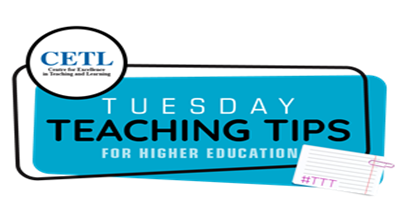
Good day Colleagues,
Welcome back for another installment in our Tuesday Teaching Tips (TTT) Blog.
In our previous instalments of TTT for the semester thus far, we have explored topics such as accessing myelearning, adding learning resources to your course site, reflective writing, action research and peer observation. This week, we will explore exemplary learning outcomes. Learning outcomes are the foundations upon which all other course elements are built, and are therefore quite important in effective teaching and learning in any context or mode of delivery (face-to-face, online or blended).
A – What is a Learning Outcome?
A learning outcome (LO) may be defined as the knowledge, skills, or attitudes your learners acquire as a result of participating in your course or lesson. More specifically, learning outcomes are statements indicating the end result for a learner following a course or learning activity. It specifies what you can observe the learner do after a learning experience/activity.
For this reason, learning outcomes should focus on:
-
The result of the learning experiences
-
The essential knowledge, skills and attitudes
-
The desired end of the learning experience (not the means or the process)
-
The basic performance tenets that must be satisfied to successfully complete your course or programme
-
Answering the question: “Why should a student do this course?” or “Why is your course important?” or, “What will a learner gain by completing your course?”
B – The Essential Features of a Learning Outcome
The essential features of a learning outcome may be encapsulated in an acronym. An exemplary learning outcome is a S.M.A.R.T. learning outcome. S.M.A.R.T. is an acronym that stands for Specific, Measurable, Achievable, Relevant, and Time-bound. When setting learning outcomes, it’s important to make them SMART. This ensures that your learning outcomes are clear, focused, and achievable. Here’s what each of the letters in S.M.A.R.T. stands for:
-
Specific: The outcome should be clear and specific, with no room for interpretation or confusion. It should answer the questions: What do I want to achieve? Why is it important? Who is involved?
-
Measurable: The outcome should be measurable so that progress can be tracked and evaluated. It should answer the question: How will I know when I have achieved it?
-
Achievable: The outcome should be realistic and achievable, given the available resources, time, and skills. It should answer the question: Is it possible to achieve?
-
Relevant: The outcome should be relevant to the learner’s goals and interests, as well as the broader context of the learning program. It should answer the question: Why is it relevant and meaningful to me?
-
Time-bound: The outcome should have a clear timeframe for achievement, which helps to focus the learner’s efforts and provides a sense of urgency. It should answer the question: When will I achieve it?
C – Tips for Creating Exemplary Learning Outcomes
There are several approaches one may take in creating exemplary learning outcomes (e.g. the ABC method, a formulaic approach). Whatever approach is used, it is important that your learning outcomes are clear, succinct, specific and most of all, measurable. The following are five tips you should consider as you create your exemplary learning outcomes:
-
Start with the handle “By the end of this session, you/students will be able to…” This establishes a student centred approach by establishing the basic skills, knowledge and emotions a learner will develop after a learning experience.
-
Each learning outcome should start with a verb.
This verb must be an observable action i.e. a measurable form of behaviour
-
Use one verb per learning outcome:
Multiple verbs in a single learning outcome makes it immeasurable.
-
Include one task per outcome:
This makes the learning outcome very specific and measurable
-
Use a range of verbs in a list of learning outcomes:
Use verbs from different levels of thinking (e.g. create, apply, identify)
Using the aforementioned, the following are exemplary learning outcomes:
By the end of this lesson, students will be able to:
-
Assess the various measures of flood prevention in the Caribbean
-
Describe case studies of flood prevention among Caribbean territories
-
Apply methods of flood prevention in a local community
D – Helpful Resources on Learning Outcomes
The following are a few resources that may help you in creating exemplary learning outcomes. You may also be interested in registering for our webinar on Learning Outcomes – Writing and Alignment, which takes place on Wednesday 2nd October, 2024 at 10:00 AM.
If so, please see the link below:
-
Learning Outcomes – Writing and Alignment (Webinar Registration)
-
Policies and Forms on Teaching and Learning at the UWI
